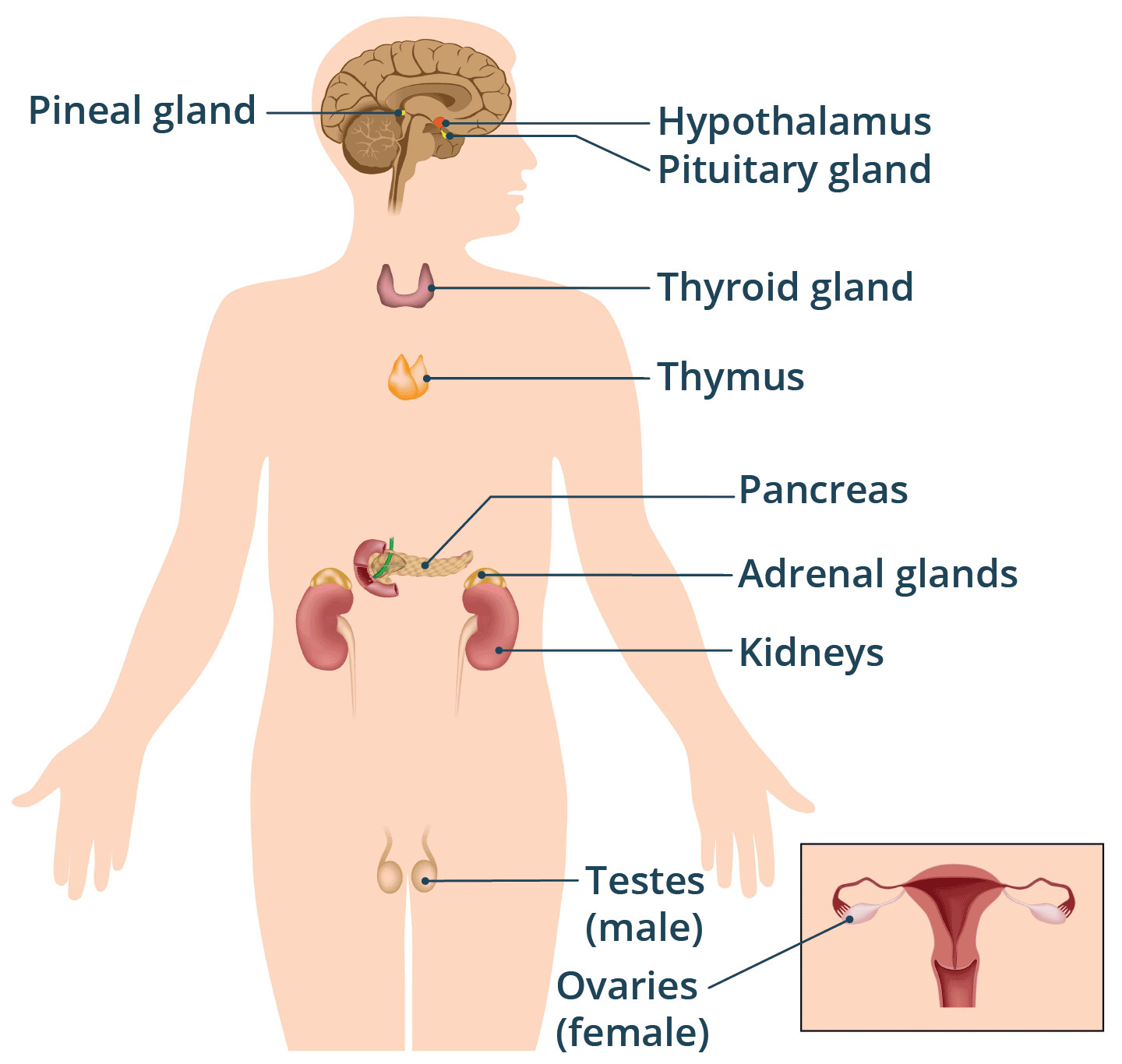Your adrenal glands are vital components of your endocrine system, playing a crucial role in producing hormones that regulate various bodily functions. Understanding Where Are The Adrenal Glands Located is the first step to appreciating their significance. These small but mighty glands are positioned strategically within your body to perform their essential tasks effectively.
Location of the Adrenal Glands: Atop Your Kidneys
As the name “adrenal” suggests (ad-renal, meaning “near the kidney”), these glands are located adjacent to your kidneys. Specifically, you will find adrenal glands located on top of each kidney. You have two adrenal glands, one situated at the apex of each kidney, nestled in the retroperitoneal space – the area behind the abdominal cavity lining. Their triangular shape allows them to sit comfortably on the upper pole of the kidneys.
 Diagram illustrating the endocrine system and the location of adrenal glands on top of the kidneys.
Diagram illustrating the endocrine system and the location of adrenal glands on top of the kidneys.
This location is not arbitrary. Being situated near the kidneys facilitates their interaction with the renal system and allows for efficient hormone distribution throughout the body via the bloodstream.
What Do the Adrenal Glands Do? Key Functions
Now that we’ve addressed where are the adrenal glands located, let’s delve into their functions. Despite their small size, adrenal glands are responsible for producing a wide array of hormones essential for life. These hormones are critical for managing:
- Blood Pressure Regulation: Adrenal glands produce hormones like aldosterone that help maintain the balance of sodium and potassium in your body, directly impacting blood pressure.
- Metabolism: Hormones such as cortisol are vital in regulating your metabolism, influencing how your body uses carbohydrates, fats, and proteins for energy.
- Stress Response: The adrenal glands are famous for producing adrenaline (epinephrine), the hormone responsible for your body’s “fight or flight” response to stress. This hormone prepares you to react quickly in stressful situations.
Hormones Produced by the Adrenal Glands
The adrenal glands are hormone factories, producing a diverse range of chemical messengers, including:
- Adrenaline (Epinephrine): Crucial for the acute stress response, adrenaline increases heart rate, boosts blood flow to muscles, and triggers the release of glucose for quick energy. This is your body’s rapid response system to perceived threats or excitement.
- Cortisol: Often referred to as the “stress hormone,” cortisol plays a broader role than just stress response. It influences metabolism, regulates blood sugar levels, reduces inflammation, and helps control blood pressure and heart rate. However, chronic elevation of cortisol can be detrimental.
- Aldosterone: This hormone is key to maintaining electrolyte balance, particularly sodium and potassium, which directly affects blood pressure and fluid balance within the body.
- Dehydroepiandrosterone (DHEA) and Testosterone: The adrenal glands also produce precursor hormones like DHEA and small amounts of testosterone. These contribute to the development of secondary sexual characteristics and have other roles in the body.
Medical Conditions Related to Adrenal Gland Function
While adrenal glands are resilient, several conditions can arise if they malfunction. Adrenal gland disorders are relatively uncommon, but understanding them is important. Some key conditions include:
- Cushing’s Syndrome: This condition occurs when the body is exposed to excessive cortisol for prolonged periods. Symptoms can include weight gain, a rounded face, thin skin, easy bruising, and elevated blood sugar. Cushing’s syndrome can be caused by medications or adrenal tumors.
- Addison’s Disease: Also known as primary adrenal insufficiency, Addison’s disease is characterized by the adrenal glands not producing enough cortisol and aldosterone. Symptoms include fatigue, weight loss, skin darkening, salt cravings, and low blood pressure.
- Congenital Adrenal Hyperplasia (CAH): This is a genetic condition usually diagnosed in infancy or childhood where the adrenal glands are unable to produce cortisol properly. It can lead to hormonal imbalances and affect development.
- Conn Syndrome: This condition involves the overproduction of aldosterone, often due to a benign tumor in one adrenal gland. Conn syndrome leads to high blood pressure and low potassium levels.
Understanding where are the adrenal glands located and their diverse functions highlights their essential role in maintaining overall health. If you suspect any issues with your adrenal glands, it’s crucial to consult with a healthcare professional for proper diagnosis and management.
For further information and support regarding adrenal glands and related conditions, you can explore resources like Hormones Australia and the Australian Addison’s Disease Association. You can also seek immediate health advice from helplines like healthdirect for any health concerns.
